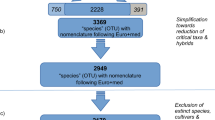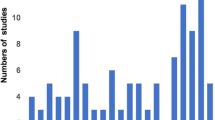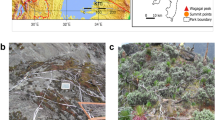Abstract
The causes of the gradients in species richness remain contentious because of multiple competing hypotheses, significant knowledge gaps, and regional effects of environmental and historical factors on species pools. Coastal zones are subject to particular sets of environmental constraints, thus identifying the drivers of species richness therein should shed light on the regional gradients of species diversity. Here, we investigate the geographic patterns and drivers of plant diversity across coastal regions while allowing for pervasive sampling deficiencies. Based on 142708 records of flowering plant occurrences, we mapped species richness and estimated the level of knowledge across the coastal zone of Brazil. Based on inventory completeness, we used linear regression models to test the predictive power of environmental variables that represent different environmental hypotheses. Few cells (25%) were well-surveyed, reflecting little knowledge about the distribution and diversity of flowering plants on the highly-populated Brazilian coast. Still, we found support for the habitat heterogeneity hypothesis as the best explanation of the variation in species richness of flowering plants in this region. Soil properties and water constraints are also important factors. Although our work emphasises the paucity of information on plant diversity in tropical and human-dominated areas, we show that knowledge limitations should not curb our capability of addressing hypotheses about species diversity.


Similar content being viewed by others
Data availability
The list of species can be accessed in Online Resource 1, Table S3. Further data can be made available by the corresponding author upon request.
References
Alves DMCC, Diniz-Filho JAF, Souza KS, Gouveia FS, Villalobos F (2018) Geographic variation in the relationship between large-scale environmental determinants and bat species richness. Basic Appl Ecol 27:1–8. https://doi.org/10.1016/j.baae.2017.12.002
Araujo DSD, Pereira MCA (2009) Sandy coastal vegetation. In: Del Claro K, Oliveira PS, Rico-Gray V (eds) Encyclopedia of life support systems (EOLSS): tropical biology and conservation management-EOLSS-UNESCO. Oxford, Brazil, pp 173–189
Ballesteros-Mejia L, Kitching IJ, Jetz W, Nagel P, Beck J (2013) Mapping the biodiversity of tropical insects: species richness and inventory completeness of African Sphingid moths. Glob Ecol Biogeogr 22:586–595. https://doi.org/10.1111/geb.12039
Barbour MG (1992) Life at the leading edge: the beach plant syndrome. In: Seeliger U (ed) Coastal plant communities of Latin America. Academic Press, San Diego, pp 291–308
BFG-The Brazil Flora Group (2018) Brazilian flora 2020: innovation and collaboration to meet target 1 of the Global Strategy for Plant Conservation (GSPC). Rodriguésia 69:1513–1527
Bonilha RM, Casagrande JC, Soares MR, Reis-Duarte RM (2012) Characterization of the soil fertility and root system of restinga forests. Rev Bras Ciênc do Solo 36:1804–1813. https://doi.org/10.1590/s0100-06832012000600014
Borcard D, Gillet F, Legendre P (2011) Numerical ecology with R, Use R. Springer Science+Business Media, LLC, New York. https://doi.org/10.1007/978-1-4419-7976-6
Cantidio LS, Souza AF (2019) Aridity, soil and biome stability influence plant ecoregions in the Atlantic Forest, a biodiversity hotspot in South America. Ecography 42:1887–1898. https://doi.org/10.1111/ecog.04564
Carvalho G (2020) Tools for Interacting with the Brazilian Flora 2020. Available: http://www.github.com/gustavobio/flora. Accessed 11 May 2020
CEPEL/UFRJ - Electric Energy Research Center/Federal University of Rio de Janeiro (2017) Wind energy in Brazil. Available: http://www.cepel.br. Accessed 21 April 2017.
Condamine FL, Sperling FAH, Wahlberg N, Rasplus J-Y, Kergoat GJ (2012) What causes latitudinal gradients in species diversity? Evolutionary processes and ecological constraints on swallowtail biodiversity. Ecol Lett 15:267–277. https://doi.org/10.1111/j.1461-0248.2011.01737
Cramer MJ, Willig MR (2005) Habitat heterogeneity, species diversity and null models. Oikos 108:209–218. https://doi.org/10.1111/j.0030-1299.2005.12944.x
Currie D (1991) Energy and large-scale patterns of animal and plant-species richness. Am Nat 137:27–49. https://doi.org/10.1086/285144
Eiserhardt WL, Bjorholm S, Svenning JC, Rangel TF, Balslev H (2011) Testing the water-energy theory on American Palms (Arecaceae) using geo-graphically weighted regression. PLoS One 6(11):e27027. https://doi.org/10.1371/journal.pone.0027027
Enquist BJ, Condit R, Peet RK, Schildhauer M, Thiers BM (2016) Cyberinfrastructure for an integrated botanical information network to investigate the ecological impacts of global climate change on plant biodiversity. PeerJ Preprints 4:e2615v2. https://doi.org/10.7287/peerj.preprints.2615v2
Fernandes MF, Queiroz LP (2015) Floristic surveys of Restinga Forests in southern Bahia, Brazil, reveal the effects of geography on community composition. Rodriguésia 66:51–73. https://doi.org/10.1590/2175-7860201566104
Fick SE, Hijmans RJ (2017) Worldclim 2: new 1-km spatial resolution climate surfaces for global land areas. Int J Climatol 37:4302–4315. https://doi.org/10.1002/joc.5086
Fischer G, Nachtergaele F, Prieler S, van Velthuizen HT, Verelst L, Wiberg D (2008) Global agro-ecological zones assessment for agriculture. Available: http://www.fao.org/soils-portal/soil-survey/soil-maps-and-databases/harmonized-world-soil-database-v12/en/. Accessed 21 Nov 2018.
Francis AP, Currie DJ (2003) A globally consistent richness-climate relationship for angiosperms. Am Nat 161:523–536. https://doi.org/10.1086/368223
Global Soil Data Task Group (2000) Global gridded surfaces of selected soil characteristics. Available: https://webmap.ornl.gov/ogcdown/index.jsp. Accessed 21 Nov 2017.
Gouveia SF, Hortal J, Cassemiro FAZ, Rangel TF, Diniz-Filho JAF (2013) Nonstationary effects of productivity, seasonality, and historical climate changes on global amphibian diversity. Ecography 36:104–113. https://doi.org/10.1111/j.1600-0587.2012.07553.x
Hawkins BA, Field R, Cornell HV, Currie DJ, Guégan JF, Kaufman DM, Kerr JT, Mittelbach GG, Oberdorff T, O’Brien EM, Porter EE, Turner JRG (2003) Energy, water, and broad-scale geographic patterns of species richness. Ecology 84:3105–3117. https://doi.org/10.1890/03-8006
Hesp PA (1991) Ecological processes and plant adaptations on coastal dunes. J Arid Environ 21:165–191. https://doi.org/10.1016/S0140-1963(18)30681-5
Hortal J, de Bello F, Diniz-Filho JAF, Lewinsohn TM, Lobo JM, Ladle RJ (2015) Seven shortfalls that beset large-scale knowledge on biodiversity. Annu Rev Ecol Evol Syst 46:523–549. https://doi.org/10.1146/annurev-ecolsys-112414-054400
Huston M (1980) Soil nutrients and tree species richness in Costa Rican forests. J Biogeogr 7:147–157. https://doi.org/10.2307/2844707
IBGE-Instituto Brasileiro de Geografia e Estatística (2017) Bases de dados. Available: ftp://geoftp.ibge.gov.br. Accessed 17 Apr 2017.
Irl SDH, Harter DEV, Steinbauer MJ, Puyol DG, Fernández-Palacios JM, Jentsch A, Beierkuhnlein C (2015) Climate vs. topography-spatial patterns of plant species diversity and endemism on a high-elevation island. J Ecol 103:1621–1633. https://doi.org/10.1111/1365-2745.12463
Kjerfve B, Lacerda LD (1993) Mangroves of Brazil. In: Lacerda LD, Diop S (eds) Conservation and sustainable utilization of mangroves in Latin America and Africa Regions. International Society for Mangrove Ecosystems, pp 245–272.
Kreft H, Jetz W (2007) Global patterns and determinants of vascular plant diversity. PNAS 104:5925–5930. https://doi.org/10.1073/pnas.0608361104
Lacerda LD, Araújo DSD, Maciel NC (1993) Drycoastal ecosystems of the tropical Brazilian coast. In: van der Maarel E (ed) Dry Coastal-ecosystems: Africa, Asia, Oceania. Elsevier, Amsterdam, pp 477–493
Legendre P, Legendre L (2012) Numerical ecology, 3rd edn. Elsevier, Amsterdam
Li L, Wang Z, Zerbe S, Abdusalih N, Tang Z, Ma M, Yin L, Mohammat A, Han W, Fang J (2013) Species richness patterns and water-energy dynamics in the drylands of Northwest China. PLoS ONE 8(6):e66450. https://doi.org/10.1371/journal.pone.0066450
Lobo JM, Castro I, Moreno JC (2001) Spatial and environmental determinants of vascular plant species richness distribution in the Iberian Peninsula and Balearic Islands. Biol J Linn Soc 73:233–253. https://doi.org/10.1006/bijl.2001.0543
Lobo JM, Hortal J, Yela JL, Millán A, Sánchez-Fernández D, García-Roselló E, González-Dacosta J, Heine J, González-Vilas L, Guisande C (2018) KnowBR: an application to map the geographical variation of survey effort and identify well-surveyed areas from biodiversity databases. Ecol Indic 91:241–248. https://doi.org/10.1016/j.ecolind.2018.03.077
Lü L, Cai H, Yang Y, Wang Z, Zeng H (2018) Geographic patterns and environmental determinants of gymnosperm species diversity in China. Biodivers Sci 26:1133–1146. https://doi.org/10.17520/biods.2018098
Lüttge U (2008) Physiological ecology of tropical plants, 2nd edn. Springer, Berlin
Magnago LFS, Martins SV, Schaefer CEGR, Neri AV (2012) Restinga forests of the Brazilian coast: richness and abundance of tree species on different soils. An Acad Bras Ciênc 84:807–822. https://doi.org/10.1590/S0001-37652012000300023
Magurran AE (2004) Measuring biological diversity, 1st edn. Blackwell Science, Oxford
BS Maitner B Boyle N Casler R Condit J Donoghue SM Durán D Guaderrama CE Hinchliff PM Jørgensen NJB Kraft B McGill C Merow N Morueta-Holme RK Peet B Sandel M Schildhauer SA Smith J-C Svenning B Thiers C Violle S Wiser BJ Enquist (2017) The bien r package: a tool to access the Botanical Information and Ecology Network (BIEN) database Methods. Ecol Evol.1–7. https://doi.org/10.1111/2041-210X.12861
Mao LF, Bin CS, Zhang JL, Hou Y-H, Zhou G-S, Zhang X-S (2013) Vascular plant diversity on the roof of the world: spatial patterns and environmental determinants. J Syst Evol 51:371–381. https://doi.org/10.1111/j.1759-6831.2012.00240.x
Marques MCM, Silva SM, Liebsch D (2015) Coastal plain forests in southern and southeastern Brazil: ecological drivers, floristic patterns and conservation status. Braz J Bot 38:1–18. https://doi.org/10.1007/s40415-015-0132-3
Maun MA (2009) The biology of coastal sand dunes, 1st edn. Oxford University, New York
McKinney ML (2008) Effects of urbanization on species richness: a review of plants and animals. Urban Ecosyst 11:161–176. https://doi.org/10.1007/s11252-007-0045-4
Medinski TV, Mills AJ, Esler KJ, Schmiedel U, Jürgens N (2010) Do soil properties constrain species richness? Insights from boundary line analysis across several biomes in south western Africa. J Arid Environ 74:1052–1060. https://doi.org/10.1016/j.jaridenv.2010.03.004
Meyer C, Weigelt P, Kreft H (2016) Multidimensional biases, gaps and uncertainties in global plant occurrence information. Ecol Lett 19:992–1006. https://doi.org/10.1111/ele.12624
MMA - Ministério do Meio Ambiente (2017) i3Geo. Available: http://mapas.mma.gov.br/i3geo/datadownload.htm. Accessed 17 Apr 2017
Moraes CAR (2007) Contribuição para a gestão da zona costeira do Brasil: elementos para uma geografia do litoral brasileiro, 1st edn. Annablume, São Paulo
New M, Hulme M, Jones PD (1999) Representing 20th century space-time climate variability. Part I: development of a 1961–1990 mean monthly terrestrial climatology. J Clim 12:829–856. https://doi.org/10.1175/1520-0442(1999)012%3c0829:RTCSTC%3e2.0.CO;2
Odgaard MV, Bøcher PK, Dalgaard T, Moeslund JE, Svenning JC (2014) Human-driven topographic effects on the distribution of forest in a flat, lowland agricultural region. J Geogr Sci 24:76–92. https://doi.org/10.1007/s11442-014-1074-6
Oliveira U, Paglia AP, Brescovit AD, Carvalho CJB, Silva DP, Rezende DT, Leite FSF, Batista JAN, Barbosa JPPP, Stehmann JR, Ascher JS, Vasconcelos MF, De Marco JP, Löwenberg-Neto P, Dias PG, Ferro VG, Santos AJ (2016) The strong influence of collection bias on biodiversity knowledge shortfalls of Brazilian terrestrial biodiversity. Divers Distrib 22:1232–1244. https://doi.org/10.1111/ddi.12489
Pelayo-Villamil P, Guisande C, Manjarrés-Hernández A, Jiménez LF, Granado-Lorencio C, García-Roselló E, González-Dacosta J, Heine J, González-Vilas L, Lobo JM (2018) Completeness of national freshwater fish species inventories around the world. Biodivers Conserv 27:3807–3817. https://doi.org/10.1007/s10531-018-1630-y
R Development Core Team (2018) R: a language and environment for statistical computing. Available: http://www.R-project.orgS. Accessed 06 Sep 2018.
Rangel TFLVB, Diniz-Filho JAF, Bini LM (2010) SAM: a comprehensive application for spatial analysis in macroecology. Ecography 33:46–50. https://doi.org/10.1111/j.1600-0587.2009.06299.x
Ratkowski DA (1990) Handbook of nonlinear regression models, 1st edn. Marcel Dekker, New York
Ricklefs RE (2004) A comprehensive framework for global patterns in biodiversity. Ecol Lett 7:1–15. https://doi.org/10.1046/j.1461-0248.2003.00554.x
Rizzini AT (1997) Tratado de fitogeografia do Brasil: aspectos ecológicos, sociológicos e florísticos, 2nd edn. Âmbito Cultural, Rio de Janeiro
Rohde K (1992) Latitudinal gradients in species diversity: the search for the primary cause. Oikos 65:514–527
Sandel B, Svenning JC (2013) Human impacts drive a global topographic signature in tree cover. Nat Commun 4(1):1–4. https://doi.org/10.1038/ncomms3474
Scarano FR (2002) Structure, function and floristic relationships of plant communities in stressful habitats marginal to the Brazilian Atlantic Rainforest. Ann Bot 90:517–524. https://doi.org/10.1093/aob/mcf189
Silva KJP, Souza AF (2018a) Common species distribution and environmental determinants in South American coastal plains. Ecosphere 9(6):e02224. https://doi.org/10.1002/ecs2.2224
Silva AC, Souza AF (2018b) Aridity drives plant biogeographical sub regions in the Caatinga, the largest tropical dry forest and woodland block in South America. PLoS One 13:1–22. https://doi.org/10.1371/journal.pone.0196130
Sousa-Baena MS, Garcia LC, Peterson AT (2014) Completeness of digital accessible knowledge of the plants of Brazil and priorities for survey and inventory. Divers Distrib 20:369–381. https://doi.org/10.1111/ddi.12136
Stropp J, Ladle RJ, Malhado ACM, Hortal J, Gaffuri J, Temperley WH, Skøien JO (2016) Mapping ignorance: 300 years of collecting flowering plants in Africa. Global Ecol Biogeogr 25:1085–1096. https://doi.org/10.1111/geb.12468
Tilman D (1994) Competition and biodiversity in spatially structured habitats. Ecology 75:2–16. https://doi.org/10.2307/1939377
Trabucco A, Zomer RJ (2019). Global high-resolution soil-water balance: CGIAR Consortium for Spatial Information. Available: http://www.cgiar-csi.org. Accessed 11 Oct 2019.
Ugland KI, Gray JS, Ellingsen KE (2003) The species-accumulation curve and estimation of species richness. J Anim Ecol 72:888–897. https://doi.org/10.1046/j.1365-2656.2003.00748.x
WCS/CIESIN-Wildlife Conservation Society/Center for International Earth Science Information Network (2002) Global human footprint dataset. Available: https://sedac.ciesin.columbia.edu/. Accessed 09 Jun 2020.
Willig MR, Kaufmann DM, Stevens RD (2003) Latitudinal gradients of biodiversity: pattern, process, scale and synthesis. Annu Rev Ecol Evol S 34:273–309. https://doi.org/10.1146/annurev.ecolsys.34.012103.144032
Yang W, Ma K, Kreft H (2013) Geographical sampling bias in a large distributional database and its effects on species richness—environment models. J Biogeogr 40:1415–1426. https://doi.org/10.1111/jbi.12108
Acknowledgements
EVSO was financially supported by a doctoring stipend provided by Coordenação de Aperfeiçoamento de Pessoal de Nível Superior (CAPES, Finance Code 001) and Fundação de Apoio à Pesquisa e à Inovação Tecnológica do Estado de Sergipe (FAPITEC). SFG has been supported by Conselho Nacional de Desenvolvimento Científico e Tecnológico (CNPq; Grants no. 303180/2016-1 and 451863/2019-4), and by CAPES and FAPITEC (Process no. 88881.157451/2017-01). DMCA and SFG are members of the INCT-EECBio (CNPq/FAPEG).
Author information
Authors and Affiliations
Contributions
EVSO, ML, and SFG designed the project; EVSO collected data. EVSO, DMCA, ML, and SFG performed the analyses. EVSO and SFG led the writing process, with contributions of DMCA and ML. All authors discussed the results and approved the final version.
Corresponding author
Ethics declarations
Conflict of interest
The authors declare that they have no conflict of interest.
Statement of human and animal rights
This article does not contain any studies with human participants or animals performed by any of the authors.
Additional information
Communicated by Kendi Davies.
Electronic supplementary material
Below is the link to the electronic supplementary material.
Rights and permissions
About this article
Cite this article
Oliveira, E.V.S., Alves, D.M.C., Landim, M.F. et al. Sampling effort and the drivers of plant species richness in the Brazilian coastal regions. Oecologia 195, 163–171 (2021). https://doi.org/10.1007/s00442-020-04805-7
Received:
Accepted:
Published:
Issue Date:
DOI: https://doi.org/10.1007/s00442-020-04805-7




